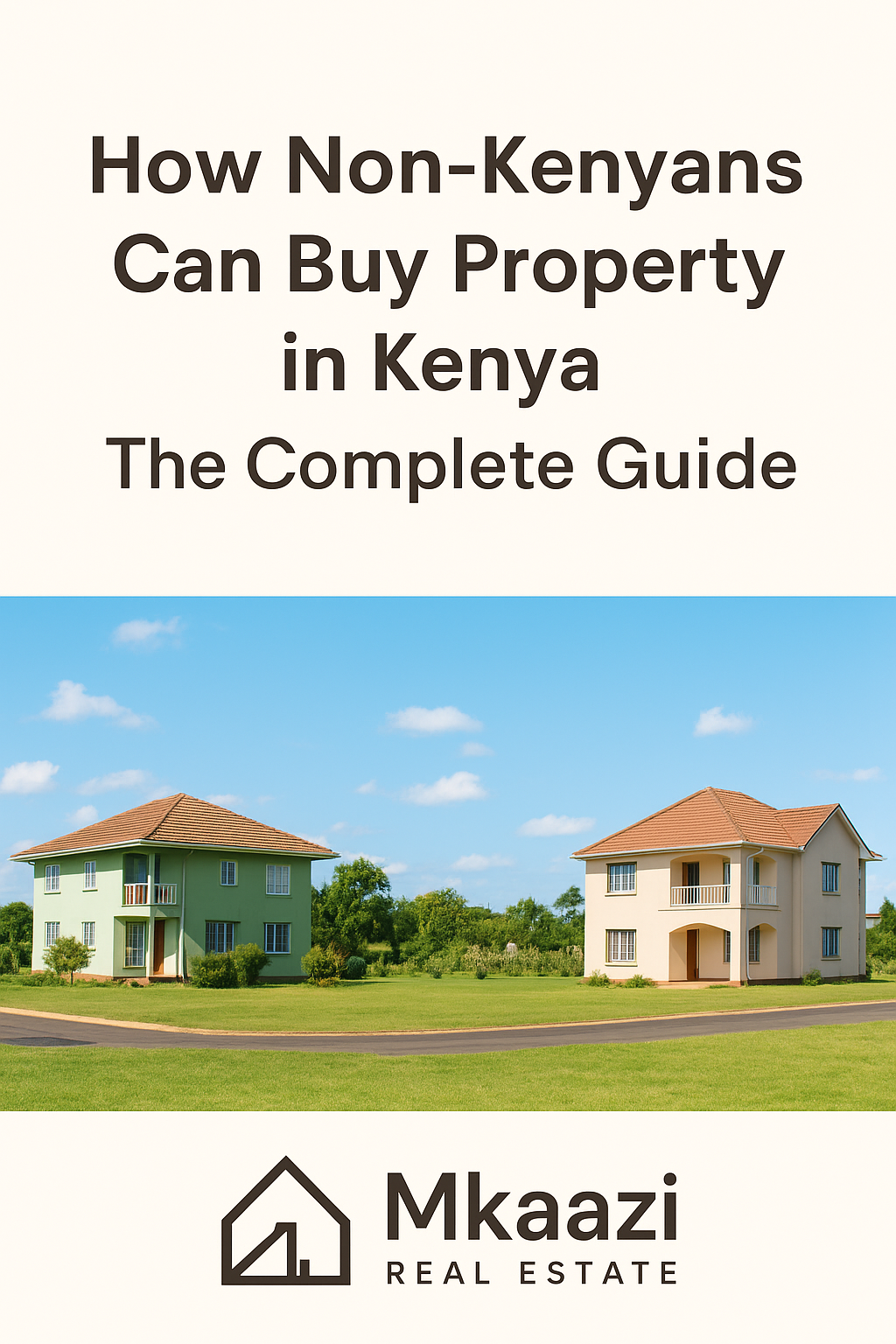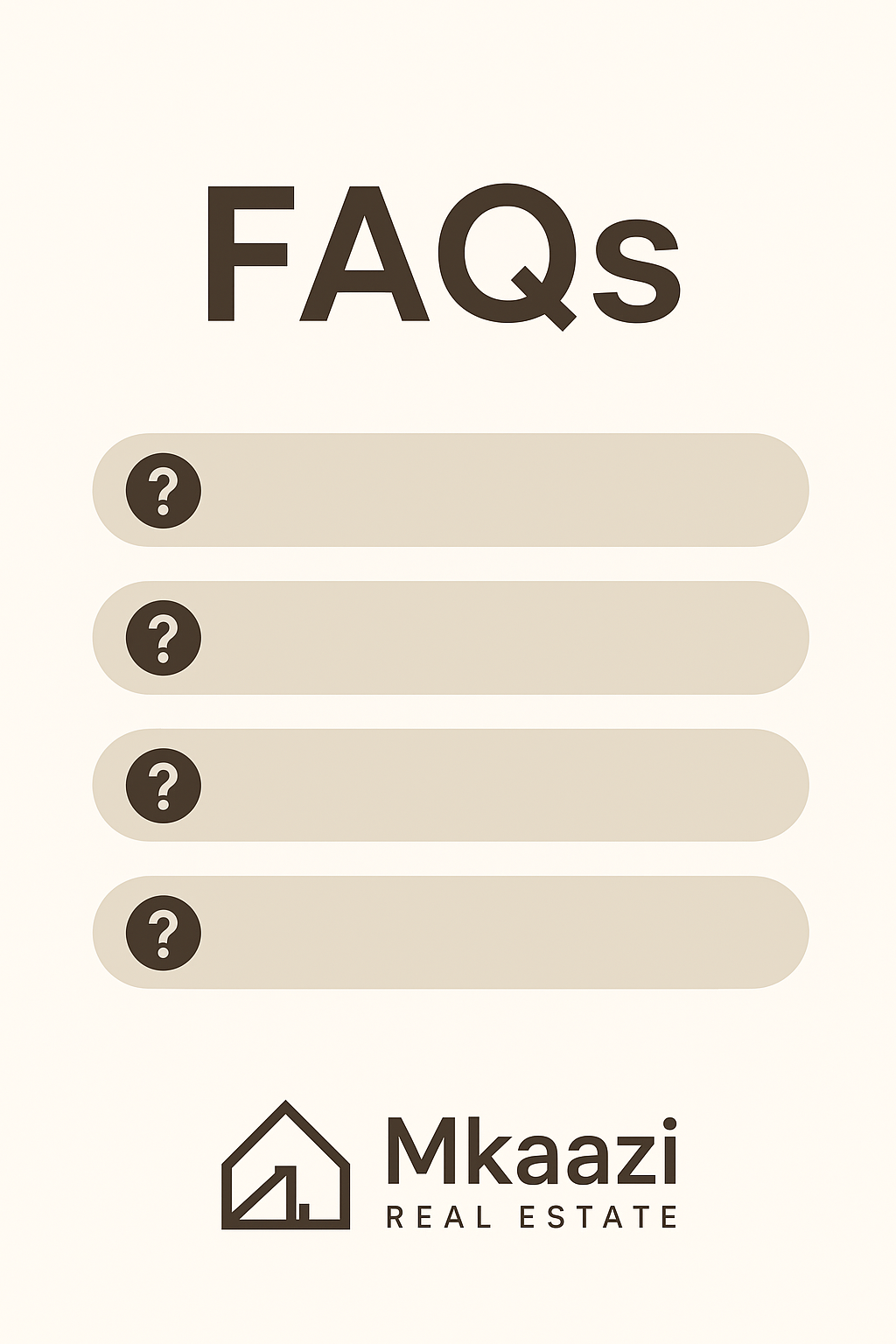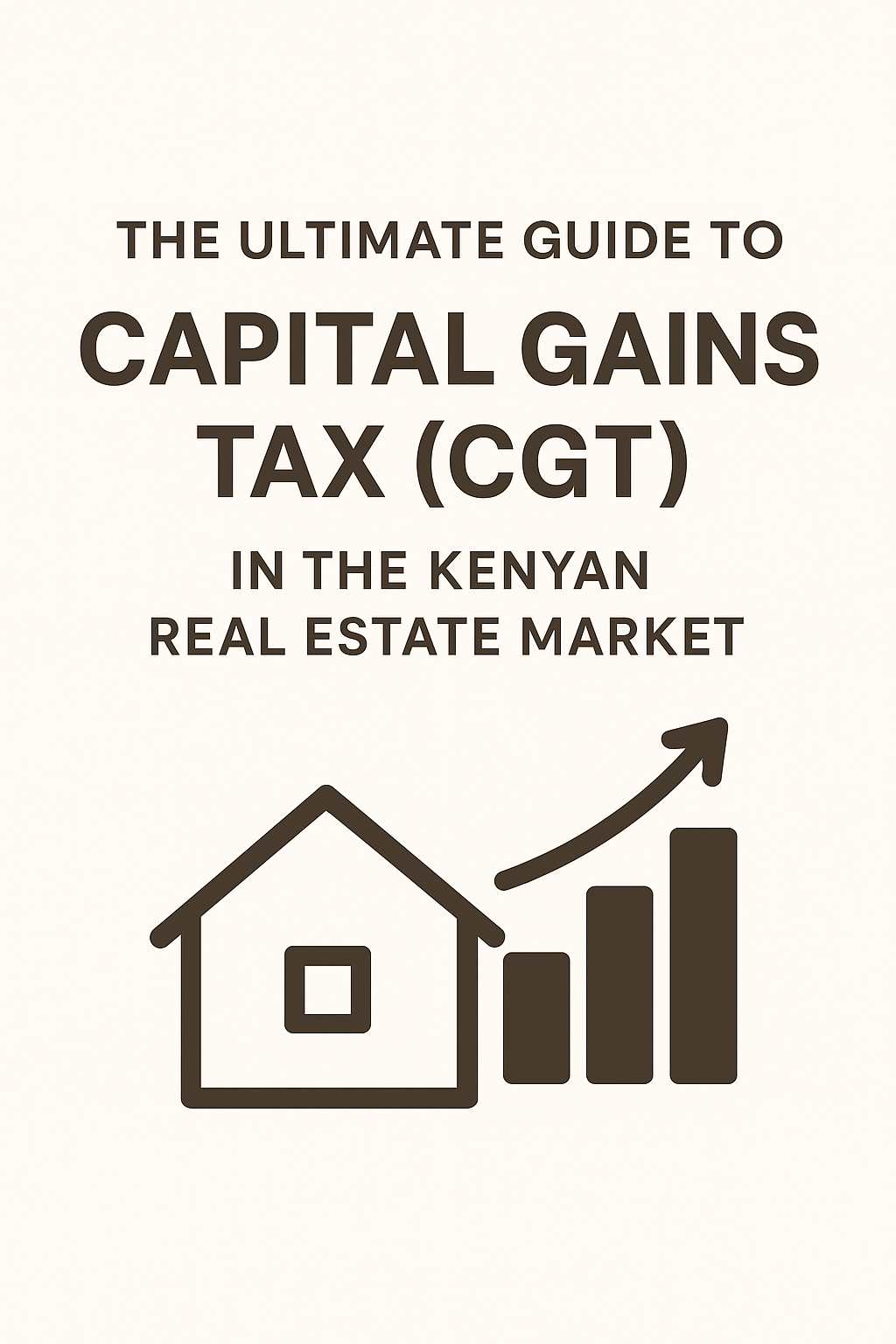How Non-Kenyans Can Buy Residential Property & Land in Kenya — A Friendly, Practical Guide
For international investors, diaspora buyers and anyone curious about owning a piece of Kenya.
Thinking of buying a home or a plot in Kenya? Beautiful choice. Whether it’s a coastal villa, a Nairobi apartment or an investment plot outside the city, Kenya is a compelling market — stunning locations, rising demand, and increasingly organised property law. But if you’re not a Kenyan citizen, the rules are different from some other countries. This guide walks you through the legal framework, the documents you’ll end up with, how freehold titles have been handled historically, how conversions to 99-year leaseholds work, expected costs, common traps, and how Mkaazi Real Estate can help every step of the way.
If you want the short version: non-Kenyan individuals and foreign-owned companies may only hold land on leasehold tenure, and any lease cannot exceed 99 years. That rule is part of the Constitution and is implemented through subsequent laws and regulations — we’ll unpack the details below. (Kenya Law)
Quick roadmap (so you can skim and then deep-dive)
- Who can hold freehold vs leasehold? — Constitution & law. (Kenya Law)
- Types of property foreigners typically buy: houses, apartments (sectional titles), commercial lots — all end up as leasehold for non-citizens. (Kenya Law)
- How to buy (step-by-step): find, due diligence, contract, KRA/stamp duty, Land Control Board (if farmland), registration & new lease issuance. (Kenya Law, Kenya Revenue Authority)
- Conversion of older freeholds / long leases to 99 years: formal conversion process by the National Land Commission; government processing fees waived. (Kenya Law)
- Typical costs and taxes: stamp duty (urban/rural rates), legal fees, surveys, annual ground rent. (Kenya Revenue Authority, Here is a blog On common Kenyan Real Estate FAQs)
Why Kenya’s rules look the way they do — a short historical snapshot
Kenya’s land law evolved from colonial-era systems that permitted very long grants and freehold interests for settlers and companies. After independence, and particularly with the 2010 Constitution, the country re-set policy to ensure land ultimately remains under national control and benefit. The 2010 Constitution introduced the important rule that non-citizens may hold land only on leasehold, not freehold, and any lease shall not exceed 99 years. This is aimed at preserving long-term national land interests while still allowing foreign investment on long-term leases. (Kenya Law)
Practically, this meant that pre-existing very long leases (historically some were 999 years or effectively freehold in operation) were regularised and limited to the 99-year cap. The government later put in regulations and conversion processes to implement that constitutional requirement in the land registries. We’ll show how that conversion works shortly. (Kenya Law)
The legal framework you need to know (primary sources)
If you want to point clients to primary sources, here are the big ones we rely on:
- The Constitution of Kenya, 2010 — Article 65 (landholding by non-citizens) is the central rule: non-citizens can only hold leasehold, and leases can’t exceed 99 years. (Kenya Law)
- Land Registration Act (No. 3 of 2012) — governs registration of interests and the form of deeds, certificates and registers. Useful for the nitty gritty on how title entries are made. (Kenya Law)
- Land Act, 2012 — deals with public land, allocation, leases from the government, and reversion of interests. See especially provisions on leases and reversion. (Kenya Law)
- Land Control Act (Cap. 302) — important because it controls transfers/leases of agricultural land via the local Land Control Board (LCB). Many farmland deals involving foreigners must go through the LCB (and the LCB has powers to refuse). (Kenya Law)
- Sectional Properties Act (2020) — governs apartments and sectional titles, so if you buy a flat your ownership will be documented under this law. (Kenya Law)
- Land Regulations / Conversion Provisions — these explain how existing freeholds/long leases owned by non-citizens are to be converted to 99-year leases and note the process (resurvey, surrender of title, new lease issuance), including that government processing fees for the conversion are waived. (See the Regulations for the conversion procedure). (Kenya Law)
We’ll reference these as we go so you — and your clients — can check primary sources.
Who can own freehold land in Kenya?
Short answer: Kenyan citizens and companies entirely owned by Kenyan citizens. The Constitution expressly says a body corporate is regarded as Kenyan only if it’s wholly owned by citizens; trusts count as Kenyan only if all beneficial interests are held by Kenyan citizens. This is why nominee structures or partial foreign ownership don’t get around the rule — the law looks to the real owners. (Kenya Law)
Implication: if a foreign investor wants truly unlimited freehold, there’s no legal route for that under current constitutional rules. Everything for foreigners is leasehold up to 99 years. If you want farmland (agricultural land) the hurdle is even higher because of the Land Control Act — many Board offices will refuse to approve transfers to foreigners. (Kenya Law)
What kinds of properties do foreigners typically buy?
- Urban residential plots and houses (Nairobi suburbs, Mombasa, Kisumu fringe, resort towns) — usually straightforward leasehold purchases (no LCB needed unless classified agricultural). (Kenya Law)
- Apartments / condominiums (sectional titles) — governed by the Sectional Properties Act; you get a unit certificate (lease) and rights in common areas. Many foreigners buy apartments because the sectional structure is clean and easy to manage. (Kenya Law)
- Commercial properties in towns or industrial plots — similar to residential, typically leasehold for foreigners. (Kenya Law)
- Coastal/vacation plots — popular with foreigners, but still subject to the 99-year cap; because these plots can attract public sensitivity, it’s prudent to check zoning and any special coastal regulations. (There have been debates and regulatory changes around coastal land, so always double-check.) (Kenya Law)
What foreigners usually can’t directly buy: agricultural farmland (without satisfying special criteria or using 100% Kenyan ownership structures). If farmland is your goal, you’ll need specific legal structuring and local counsel. (Kenya Law)
Step-by-step: How a non-Kenyan buys property in Kenya (detailed)
Below is the practical workflow we use with our international clients. I’ll explain why each step matters and what to watch out for.
1) Decide what you want & choose the area
Think: coastal villa vs Nairobi apartment vs a suburban plot for development. Zoning and intended use matters. For example, farmland triggers extra checks; urban plots are usually simpler. Work with a licensed agent who knows the locality — they’ll spot red flags (e.g., disputed parcels, public easements, or pending compulsory acquisitions). Mkaazi keeps an up-to-date portfolio and will recommend areas that match your investment timeframe and lifestyle goals.
2) Conduct preliminary checks (title search & land classification)
Before you write a deposit, a lawyer must pull a search at the Lands Registry to confirm the current registered proprietor, encumbrances (mortgages, caveats), and the nature of the title (whether it’s freehold, leasehold, or has conditions). It also reveals whether the land is in a land-control area (agricultural) where Land Control Board consent is needed. This is non-negotiable — skipping it is how scams happen. (Kenya Law)
3) Agreement to sell (sale agreement)
Once you’re comfortable, you sign a sale agreement. Typical elements:
- parties & IDs,
- purchase price and currency,
- deposit amount & escrow arrangements,
- conditions precedent (e.g., Land Control Board consent),
- who pays what costs (stamp duty, legal fees), and
- timeline for transfer.
Make sure the agreement references transfer or issuance of the 99-year lease (if seller is a foreigner with older title, the contract should reflect statutory conversion where applicable). Mkaazi templates are clear and protect buyers — we can provide a sale agreement tailored to foreigners.
4) Apply for Land Control Board consent (if agricultural)
If the plot is agricultural or within a land control area, you must apply to the local Land Control Board. The board will require a completed application, identity documents, a sketch plan, and often reasons why the transfer should be granted. Boards may refuse transfers to non-citizens unless the buyer has a legal pathway (e.g., a company that meets citizen ownership rules). Plan extra time for this. (Kenya Law)
5) Pay stamp duty (KRA) & submit for registration
Stamp duty must be paid to KRA. For typical land transfers, the commonly applied rates are 4% for urban land and 2% for rural land (payable by the buyer on transfer) — check KRA/iTax or your lawyer for any special/updated rates. Once paid, your lawyer submits the transfer documents to the Lands Registry for registration. (Kenya Revenue Authority).
6) Registration & issuance of title / lease certificate
When the Lands Registry approves, the outgoing title is cancelled and a new lease certificate (title) in the buyer’s name is prepared and registered — for a foreign buyer this will be a leasehold for up to 99 years. If the property is an apartment unit, the Land Registry issues the sectional title / certificate as per the Sectional Properties Act. This is the moment you get legal ownership rights documented. (Kenya Law)
7) Post-registration: pay rates, comply with lease covenants
Register with the County Revenue office for property rates; keep the land rent/lease obligations current; respect any lease conditions (some leases restrict subletting or commercial use). If you plan to renovate or build, get local planning approvals and building permits.
The conversion of freehold / >99-year leases to 99-year leases — what really happens
This is one of the most common questions we get from international buyers and sellers: “I have (or the seller has) a freehold or a 999-year lease — does that disappear?” The brief answer: Yes — if a title exceeding 99 years is held by a non-citizen, the law requires it to be converted to a 99-year lease, and the National Land Commission (NLC) oversees resurvey and conversion. The Land Regulations set out a step-by-step process for conversion: notice, resurvey, surrender of the original title, preparation of the new 99-year lease, and registration. The Regulations explicitly say government processing fees for this conversion will be free of charge. (Kenya Law)
Practical implications:
- If you are the current proprietor of a pre-2010 very long lease or freehold and you are non-Kenyan, expect the NLC (or the Lands Ministry) to notify you and arrange a resurvey and exchange of your old title for a new 99-year lease certificate. (Kenya Law)
- If you buy a property from a foreign seller who still has an old freehold/long lease, your sale contract should recognise that the registered interest will be treated as a 99-year lease (the conversion may already have been done by authorities). The Regulations also say transfers from a non-citizen to a citizen after 27 Aug 2010 are deemed to have only transferred a leasehold of no more than 99 years. (Kenya Law)
Important practical note: The Regulations give the NLC (or Registrar) the technical role of resurveying and producing new cadastral maps. The conversion may require physical resurveying and a plan, so allow for survey timelines. The good news is that the Regulations make the government cover processing fees for the conversion itself, but you (or the seller/buyer under contract) may still be liable for private surveyor fees if a new cadastral survey is requested or necessary. (Kenya Law)
Documents you will get (and what they mean)
After a smooth purchase for a non-Kenyan buyer, typical documents include:
- Certificate of Lease / Leasehold Title (registered at the Lands Registry): This is your principal ownership document showing the 99-year lease and its conditions. Treat it like a title deed for all practical purposes. (Kenya Law)
- Sale Agreement / Conveyance Document: Your contract of sale — keep this for proof of terms.
- Stamp Duty Receipt (KRA): Confirms stamp duty was paid. You need this before registration. (Kenya Revenue Authority)
- Land Rent Clearance / Rates Clearance: Evidence that land rent (if any) and county rates are up-to-date. (Kenya Law)
- Sectional Title Certificate (if apartment): A unit certificate and share certificate for common property under the Sectional Properties Act. (Kenya Law)
- Power of Attorney (if you used one): If you cannot be physically present, your lawyer may register the transfer with a POA; ensure it’s properly executed and admissible in Kenya. (Kenya Law)
Keep originals secure and register copies where required. If you plan to mortgage the property, banks will want to inspect the lease and confirm remaining term and any restrictions.
Costs you should budget for (real numbers & practical tips)
Exact amounts vary by transaction, but the usual cost items are:
- Stamp duty: Typically 4% for urban properties and 2% for rural properties on the market value or declared sale price (whichever is higher). Double-check current KRA guidance before paying — KRA/iTax is the authority. (Kenya Revenue Authority, Wacu Mureithi & Co. Advocates)
- Legal fees: Usually around 1–2% of the sale price (negotiable). This pays for conveyancing, registration, and preparing transfer documents.
- Registration fees (Lands Registry): Small fixed fees for registration and issuing the certificate.
- Survey/cadastral fees: If a new survey is required (e.g., conversion or subdivision), expect to pay the surveyor’s costs. The Regulations noted that government processing fees for the conversion are free, but private survey works can still attract costs. (Kenya Law)
- Land Control Board fees: If the sale requires LCB consent (agricultural land), the Board charges application and consent fees. Also prepare for public notices and possible land valuation costs. (Kenya Law)
- Annual land rent / ground rent: Generally low (often a nominal peppercorn rent), but ensure it is paid; unpaid rent can become an encumbrance. (Kenya Law)
Extra practical tip: currency transfer costs — sending large sums into Kenya will attract bank fees and foreign exchange spreads. Banks may also ask for proof that the funds are for legitimate property purchase (KYC). Coordinate with your bank and ask your Kenyan lawyer for recommended payment mechanisms to avoid delays.
Mortgage & finance options for foreigners
Many Kenyan banks will lend against leasehold property, but lenders assess the lease term remaining (e.g., a shorter residual lease makes lending harder). If you intend to borrow, tell your bank early and provide the lease documentation. Some international buyers use local currency mortgages, others arrange bridge financing from home institutions and pay off on registration.
If your lease has many years left (e.g., 70–99 years), lenders are usually comfortable; if the residual term is short, lenders increase interest rates or decline.
Renewal & what happens at lease expiry
A 99-year lease is long, but eventually it expires. The Land Act and regulations make provision for reversion of lease to the national or county government at expiry. In practice, lease renewals and extensions depend on government policy at that time; the law doesn’t guarantee indefinite renewal for foreign holders. Practically speaking, the current reality is that most 99-year leases issued in modern times have plenty of life remaining and are treated as secure investments, but investors should treat leasehold as a long-term finite interest and plan accordingly (estate planning, transfers to heirs, etc.). From experience however, once a property has been developed and the rates and rents have been paid faithfully over the years, the government renews them (Kenya Law).
Some guides and practitioners recommend acquiring leases with the longest possible residual life if you plan to borrow or later sell. Mkaazi can help you identify properties with strong lease terms and clear exit strategies.
Common misconceptions & traps — what foreigners often get wrong
- “I can get freehold if I set up a company.” — Not true for foreign-owned companies. A company is only deemed Kenyan if 100% owned by Kenyan citizens; otherwise the 99-year rule applies. The Constitution and implementing laws look to beneficial ownership, not just nominee arrangements. (Kenya Law)
- “Land in Kenya is ‘cheap’ and paperwork is optional.” — Not optional. Title searches and due diligence are essential. Many disputes arise from irregular allocations, forged documents, and unpaid encumbrances. Spend on lawyers and searches now; it’s far cheaper than litigating later. (Kenya Law)
- “If I buy coastal or border land it’s forbidden.” — Coastal land can be leased to foreigners, but there are sensitive categories (security, reserved public land). Always check zoning and historical restrictions. (There was litigation and regulatory debate around first-row beachfront rules — always verify the current status for a particular parcel.) (Kenya Law)
- “Conversion from freehold will cost me big government fees.” — The Regulations specifically state government processing fees for converting excessive tenures held by non-citizens to 99 years are free of charge; however, private survey and legal fees may still apply. (Kenya Law)
- “I don’t need a Kenyan KRA PIN or lawyer.” — You do. Stamp duty payments and registration tie into KRA; your lawyer will need to file documents and often act by POA if you’re absent. Don’t skip this. (Kenya Revenue Authority, Kenya Law)
Practical examples / scenarios
Scenario A — Buying a Nairobi apartment (foreign buyer):
You pick a 2-bed unit in a sectional title block. The unit is issued as a unit certificate under the Sectional Properties Act; because you’re foreign the unit’s underlying land interest is a 99-year lease. You pay 4% stamp duty, legal & registration fees, and you receive the certificate of lease for your unit. You can mortgage or sell the unit within the lease term subject to normal conditions. (Kenya Law, Kenya Revenue Authority)
Scenario B — Buying a coastal villa plot from a seller who had a pre-2010 999-year lease:
Under the conversion rules the seller’s 999-year interest would be treated as reduced to 99 years for a non-citizen. The NLC processes the conversion (resurvey etc.), and the transfer to you will be recorded as a 99-year lease. The Regulations require notice, surrender of the original title, resurvey and new lease issuance (government processing fees waived). Expect to coordinate with your lawyer and the seller on the conversion steps; our team helps manage that interaction with government authorities. (Kenya Law)
Scenario C — An investor wants to buy farmland for agribusiness:
This is the trickiest. Most Land Control Boards are reluctant to consent to transfers of agricultural land to foreigners. Strategies often involve creating a Kenyan company with Kenyan shareholders, using joint ventures, or structuring long-term lease arrangements with Kenyan partners — but each structure must be scrutinised for compliance with Article 65 and the Land Control Act. This is where good legal and local business advice matters. (Kenya Law)
Red flags we watch for (let Mkaazi do this for you)
- Title searches that reveal duplicate pending transactions or numerous caveats. (Kenya Law)
- Land described as “about X acres” with no clear registered parcel or plan. Insist on cadastral plan and exact parcel number. (Kenya Law)
- Sellers who ask for large private wire transfers before any registered contract or escrow arrangement. Use escrow and bank-verified transfers.
- Land in a disputed area (community disputes, inheritance fights). We always insist on a lawyer’s clearance. (Kenya Law)
How Mkaazi Real Estate helps international buyers (our practical services)
We know the runaround, the forms, and the local quirks. Here’s how we make buying easier and safer:
- Property sourcing: curated listings that meet legal and investment criteria.
- Title & risk checks: we coordinate title searches at the Lands Registry and check encumbrances, caveats and LCB status. (Kenya Law)
- Legal coordination: we work with vetted conveyancing advocates to prepare sale agreements, handle POAs, liaise with KRA and submit registration. (Kenya Revenue Authority, Kenya Law)
- Survey & planning: we liaise with surveyors and county planning so you don’t get surprised at the building permit stage. (Kenya Law)
- Payments & escrow: guidance on safe payment channels and coordination with Kenyan banks for foreign currency transfers.
- After-sale support: property management, handover, taxation guidance, and exit planning.
If you’d like, we’ll prepare a tailored checklist for your specific purchase (sample: Nairobi apartment vs Watamu plot vs acreage outside the city). Click here to contact us for a free initial consultation — we’ll map out timing, costs, and the exact documents you’ll need. (CTA: “Contact Mkaazi — Free Consultation”)
Final checklist for a non-Kenyan buyer (printable)
- Confirm land classification (urban, rural, agricultural).
- Instruct a Kenyan conveyancing lawyer.
- Get a Lands Registry search and copy of the title.
- Confirm whether Land Control Board consent is required.
- Budget for stamp duty (4% urban / 2% rural), legal & survey fees.
- Plan for resurvey costs if conversion or subdivision is needed.
- Use escrow and document every payment.
- Register the new lease and keep copies of all documents (lease certificate, sale agreement, receipts).
Useful primary references (read these if you want the source text)
- Constitution of Kenya, 2010 — Article 65 (Landholding by non-citizens). (Kenya Law)
- Land Regulations (conversion of freehold/long leases owned by non-citizens) — see Part III on conversion and process. (Kenya Law)
- Land Registration Act, 2012 — registration procedure and forms. (Kenya Law)
- Land Control Act (Cap. 302) — rules and consent for agricultural land transfers. (Kenya Law)
- Sectional Properties Act, 2020 — for apartment/condo ownership rules. (Kenya Law)
- Kenya Revenue Authority (KRA) guidance on stamp duty and payment. (Kenya Revenue Authority)
Closing thoughts — the buy vs the dream
Kenya offers wonderful property opportunities for international buyers. The legal landscape is clear: you won’t get perpetual freehold as a non-citizen, but you can own secure, long-term leasehold rights (up to 99 years), and those are treated in practice almost like freehold for most investor and homeowner purposes. The important thing is to go in informed, get the right legal checks, and work with trusted local partners.
Mkaazi Real Estate has helped dozens of international clients — from European retirees seeking coastal villas to diaspora professionals buying Nairobi apartments to investors acquiring development plots. We do the practical, usually tedious work so you can focus on the exciting part: choosing your home or project.
If you want, we’ll:
- prepare a personalised due diligence checklist for a specific parcel,
- introduce you to vetted conveyancing advocates and surveyors, and
- draft a plain-English timeline of the purchase for you.
Book your free property consultation with Mkaazi Real Estate Ltd
Ready to take the next step? Contact Mkaazi Real Estate today on info@mkaazirealestate.com or +254 763 568989 on Call SMS or WhatsApp for a free consultation. We’ll walk you through the documents, timelines and costs — and help make Kenya your new address.





